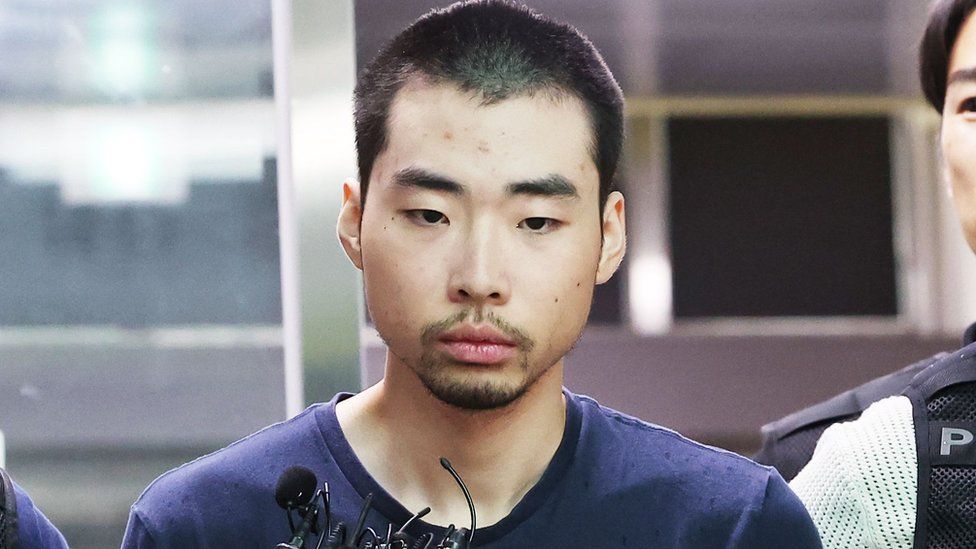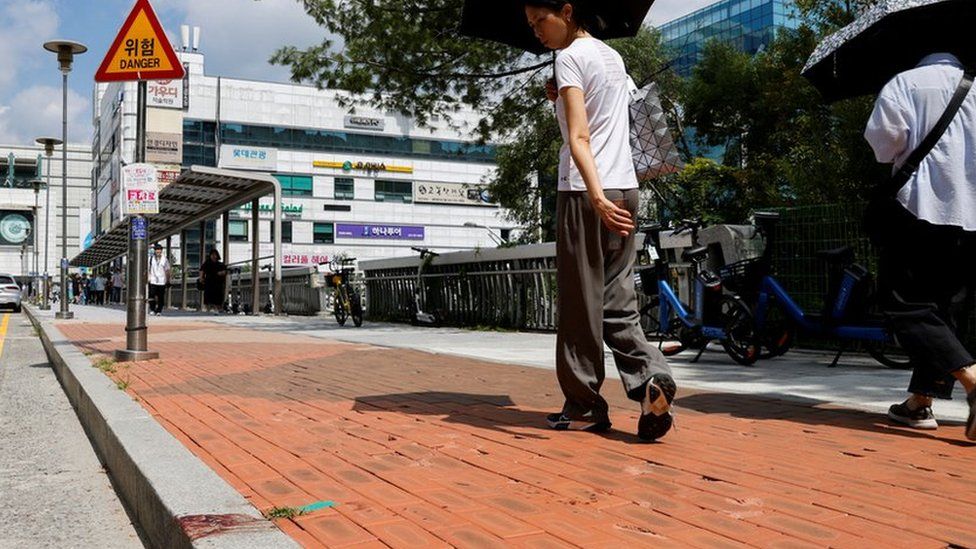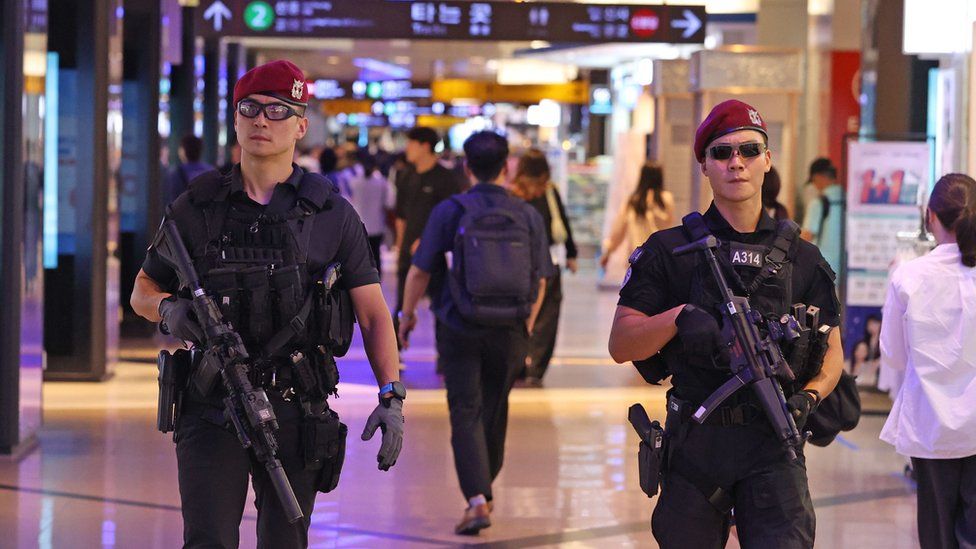A knife darting out in a packed subway car. An assailant, chasing shoppers, stabbing wildly in the street.
These nightmares have played out in the minds of many South Koreans following a mass stabbing attack last week – the country’s second in as many weeks.
On 3 August, 14 people were injured in Seongnam, south-east of Seoul, when a man rammed his car into pedestrians near a subway stop, and then ran into a department store, where he stabbed nine people. One woman died later from her injuries.
“What’s happening in South Korea these days?” cried citizens online afterwards – dazed by back-to-back stabbings in a nation known otherwise for low rates of violent crime.
“Our country used to be one of the safest in the world… but recently I can’t say that any more,” one commented on YouTube.
Just days earlier, on 21 July, another man had attacked commuters in the capital, killing one person and stabbing three more at a subway station. He later told police he lived a miserable life and “wanted to make others miserable too”.
The second attacker may have taken notes from him, evidence later showed.
Choi Won-jong was a delivery driver and high-school dropout who had been diagnosed with schizoid personality disorder. Police said the 22-year-old had googled for news about the first attack, at Sillim Station.

‘Mudjima’ crimes
In South Korea, they are known as “Don’t Ask Why” or Mudjima crimes – inexplicable acts of violence targeting strangers, driven by no personal link to victims or obvious motive.
While they’ve been called Mudjima by the public for years, it was only in 2022 that South Korean police officially designated such crimes as a distinct category: “Abnormal Motive Crimes”.
With specific definitions and a task force set up to combat them, the move appeared to show authorities finally taking the crimes seriously. In the first half of this year, police recorded 18 Mudjima acts.
While overall data shows no rise in violent crime – South Korea last year in fact recorded its lowest rates in a decade – the recent stabbings have driven the perception that Mudjima acts are more common, and society more dangerous.
It has even led to some commentators making comparisons with the US, with online remarks: “It’s the American mentality that’s going viral in South Korea” and “OMG South Korea has become the USA of Asia”.
However, experts reiterate that South Korea remains a very safe country.
“Murder and other violent crime rates are very low compared to other countries, and they have been steadily declining in the last 10 years,” said Prof Hyojong Song, a criminology expert at Korea University in Seoul.
South Korea’s homicide rate – down to 1.3 murders per 100,000 people – is half the average of OECD nations, and less than a fifth of America’s murder rate. And there are strict gun controls.
Many online said the crude comparisons to the US mask what authorities need to do locally: “They need to take a look at South Korea’s own social issues that have led to this,” one user wrote.

While the details surrounding the perpetrators are still sketchy, the little revealed so far has already fuelled public anger.
“These days there are jobless losers who are taking their ills out on everybody else,” one user wrote on Tiktok, in a vein of commentary which has become common online.
Another, on Youtube, argued that “in the past, only psychopaths would do something like this, but now we are living in a world where ordinary people are becoming murderers. People don’t have hope, the sense of panic is high and sense of happiness is low.”
Experts have pointed to underlying social pressures in South Korean society – from unstable job prospects and housing, to a continued stigma around mental health and a lack of support services. Police said Choi had not received adequate treatment.
“Fundamentally, I think we need to have some emotional and instrumental social support systems or policies that can help those who are disconnected from society, with no social bond,” Prof Song told the BBC.
Copycat threats
What drove greater anxiety among the public after last week’s stabbing was the wave of threats that popped up, vowing copycat attacks.
Online posts stated specific timings and locations, and some even named the gender of the victims they wanted to kill. One person vowed to “kill as many people as possible.”
Although many dismissed them as the work of juveniles and attention seekers, they succeeded in unnerving people.
On social media, users posted warnings for the weekend of 4-6 August: “Please avoid these areas in South Korea” was one TikTok video which drew more than 300,000 views across Asia.
“Go ahead and screenshot this- here’s a list of public stabbings on the weekend,” the host, a North American expat in Seoul, says in the video. Several subway stations were named as attack spots – as well nightlife areas, an amusement park and a women’s university stop.
“Be careful, be mindful of surroundings and stay safe out there,” they say.
In response, police mounted a “special enforcement” operation for the weekend, dispatching thousands more officers to public sites. They were told to stop and search “suspicious-looking” people- at least one person was arrested after he was seen carrying knives in public.

Authorities also moved in on the online threats, tracing people across the country through internet service addresses and tip-offs.
Following the weekend operation, police identified nearly 200 threats and arrested about 60 people – 34 of whom were teenagers, several aged 14 or under and not liable for prosecution.
One 17-year-old boy was detained for making a stabbing threat at a train station in Wonju, then reporting it to police as a tip-off.
In another case, a 14-year-old was arrested outside the subway station he had listed as a target. He had told police he had no murderous intent, but was “bored, and posted it as a joke”.
As more and more days pass without incident, some of the immediate public tension is fading.
However, fear remains on the edge of people’s minds. More people are carrying protective weapons, like mace sprays. And on subway platforms and in other crowded areas, more are staying vigilant and wary of those around them.
Last Saturday, exuberant fans on a night train returning from a BTS member’s concert sparked a near stampede, when their excited shrieks were mistaken for terror. Passengers who ran away said later they felt like they’d been in a zombie film.
A web service set up to map online threats drew more than 50,000 views in its first days of operation last week, local media reported. The service is still recording new threats each day.
On Wednesday, Korean media also reported police had identified the poster of an online threat within eight minutes of it going out. The “acts of terror” have fuelled political discussion around cracking down on crime.
Lawmakers in the past week have promised harsher criminal punishments for mass stabbings, lowering the age of criminal responsibility and amending laws to justify heavy-handed police action. On Monday, the country’s justice minister said the use of force by police should be considered self-defence.
An editorial this week in the Korean Herald summed up many people’s feelings: “It is deeply shocking to witness such violent crimes committed in a country known for a relatively high level of public safety.
“A thorough investigation to identify the specific motives of the horrifying crimes should be carried out. At the same time, police must take steps to prevent copycat crimes.















































